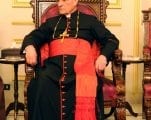
Born on 25 February 1940 in Himlaya, a locality of Mount Lebanon, Bechara Boutros al-Rahi succeeded Nasrallah Boutros Sfeir as the Maronite patriarch of Antioch and head of the Maronite Catholic church on 25 March 2011. Yet it is his ability to court controversy for which he is arguably best known.
He attended a Jesuit school, then entered the Mariamite Maronite Order in 1962 and was ordained as a priest in 1967. From 1967 to 1975, he was responsible for the Arabic programmes of Vatican Radio. Also in 1975, he received a PhD in canon and civil law.
He began gaining prominence in 1986, when he was consecrated as auxiliary bishop of Antioch, the primate of the Maronite church. In the years thereafter, the appointments followed in quick succession: on 9 June 1990, he was elected bishop of the coastal city Jbeil, in 2003, he was elected secretary of the Maronite synod and in 2009, he was appointed president of the Lebanese Episcopal Commission for the Media. Eight years later, aged 71, he was elected patriarch of the Maronites with more than two thirds of the votes. As is customary for Maronite patriarchs, he took the additional name Boutros, the Arabic version of Peter, after Saint Peter, one of the twelve apostles and the first bishop of Antioch before he moved to Rome.
During a service in the Vatican on 24 November 2012, al-Rahi was created a cardinal of the Catholic Church by Pope Benedict XVI, becoming the fourth Maronite patriarch and one of six priests, all non-Europeans, to be appointed that day. It is unusual for the pope to select only non-Europeans, but the appointments aim to reflect the international character of the Catholic Church, the pope said. The Catholic Church belongs to the whole human race, not just one group, and is a church for all peoples, he told the congregation.
As a cardinal, al-Rahi was a candidate for the papacy following the resignation of Pope Benedict XVI on 11 February 2013, and participated as a cardinal elector in the conclave that elected Pope Francis the following month. His relationship with the new pope began when the pope named him a Member of the Congregation for Catholic Education in November 2013.
A little over six months later, in May 2014, al-Rahi provoked controversy by travelling to Israel to join the pope on his Holy Land tour. Lebanon is still technically at war with Israel, although a truce was signed in 1949, and no other Maronite patriarch has ever visited the country. He defended the visit, which Hezbollah condemned as a ‘historic sin’, telling the French press agency AFP that “the pope is going to the Holy Land and Jerusalem. He is going to the diocese of the patriarch, so it’s normal that the patriarch should welcome him.”
He had previously angered opponents of the Syrian regime by supporting Hezbollah’s right to bear arms in Lebanon, and warning of an Islamist takeover of Syria if President Bashar al-Assad is overthrown. As a result of this comment, President Obama declined to meet al-Rahi during his visit to the United States, only months after his 2011 election as patriarch.
International Support and Political Involvement
Al-Rahi has had rather more success meeting the leaders of France. As France is a supporter of Middle Eastern Christians, al-Rahi was welcomed to the Elysée Palace three times by President François Hollande, in April 2013 and 2015 and, most recently, in May 2016. As a cardinal, he had already met former President Nicolas Sarkozy in 2011, when he was awarded the Grand Cross of the Legion of Honour. He used the opportunity to call on the international community to recognize Lebanon’s “neutrality”, in the face of continued regional instability and an influx of some 1.5 million Syrian refugees. His comments were aimed mainly at Hezbollah, which is helping to prop up al-Assad’s regime.
Despite the ongoing war in Syria and widespread objections from Lebanese politicians, al-Rahi attended the 2015 Assembly of Patriarchs in the Syrian capital Damascus. During the assembly, he called for peace and spoke of the plight of the millions of refugees in the region. “We shall reflect together united in thought, words and deeds. Together we shall carry the concerns of our people in Syria and Iraq as well as in various countries of the Middle East where suffering occurs, hopeful that the passion of Good Friday will be followed on the third day by the Resurrection,” he said in his homily..
Although his comments and actions continue to stir controversy in political and religious circles, he is a revered spiritual figure for Lebanon’s more than one million Maronites. He is celebrated in a book published last year by Isabelle Dillmann entitled Au coeur du chaos. La résistance d’un chrétien d’Orient (‘At the heart of chaos. The resistance of an Eastern Christian’). Presented as a series of interviews, it serves to elucidate his complex position as a religious representative of a region facing war, conflict and chaos.


